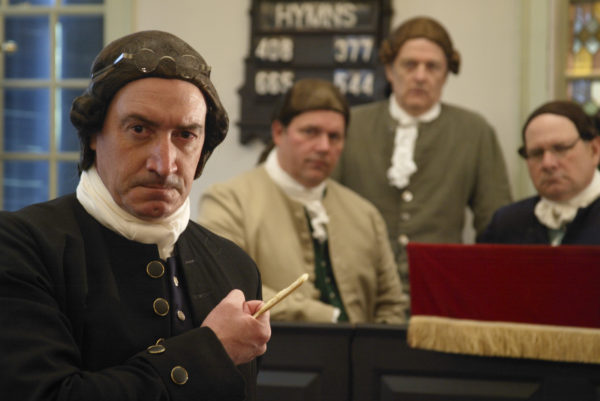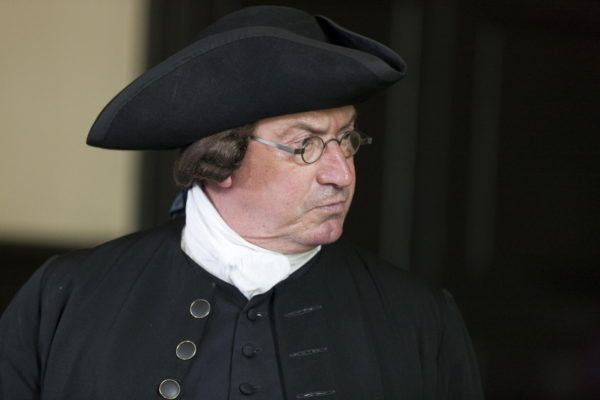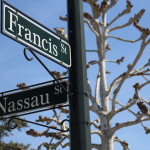
On May 30, 1765, a freshman legislator, all of nine days into his term in office, stirred up a heaping dose of trouble in Williamsburg’s Capitol. 29-year old Patrick Henry of Hanover County had the audacity to advocate resistance to—some would say rebellion against—King George III and Parliament.
The issue was the Stamp Act, which Parliament passed in March and was to take effect Nov. 1. The long-rumored measure taxed a wide variety of paper goods: not only stamps, but also newspapers, legal documents, even playing cards and dice.
The measure was Britain’s way to make the colonies pay their fair share of huge debt incurred during the recently-ended French and Indian War, and for the defense of vastly increased North American territory. Following the Treaty of Paris, British colonial claims included all formerly French territory east of the Mississippi, including Canada. Complaints that taxes assessed within the colonies constituted taxation without representation fell on deaf ears.
News of the Stamp Act was still making its way through the colonies when Patrick Henry rose to speak on this last Thursday in May. The spring session of the House of Burgesses was winding down. Many members were headed home, having tackled the typical assortment of local issues (“An Act for increasing the Rewards given for killing Wolves”!). So only 39 of 116 legislators, and a number of onlookers in the lobby, remained for a debate over what would come to be known as the Virginia Resolves.
Colonial Williamsburg owns a page of Henry’s handwritten notes from several years later (above), which tells us a little bit about what happened that day:
I had been for the first time elected a Burgess a few days before, was young, inexperienced, unacquainted with the forms of the House, and the members that composed it.” When he realized that the session was likely to end without any official action taken against the Stamp Act, Henry –“alone, unadvised, and unassisted”—scrawled a series of resolutions on “a blank leaf of an old law book.

The first two resolutions declared that the people of Virginia, by right and by tradition, were entitled to the exact same “liberties, privileges, franchises, and immunities” as any person born in England. In other words, colonists had what were broadly referred to as the rights of Englishmen. (Read the full text of all the resolutions here.)
The third and fourth resolutions argued that Virginians could only be taxed with their consent, that is, no taxation without representation. The colonists were having no part of this nonsense of “virtual representation,” the paternalistic theory Parliament was bandying about that suggested its members represented the interests of all the king’s subjects, both in Britain and the colonies.
A fifth was more strident, openly declaring that Virginia’s General Assembly alone had the legal authority to levy taxes, and that vesting power in any other entity was not only illegal, it had “a manifest Tendency to destroy British as well as American Freedom.”
Newspapers printed the text of an additional two resolutions, but it’s unclear whether they were introduced or voted upon.
Henry wrote that the resolves stirred “a violent debate” during which “many threats were uttered, and much abuse cast on me.” Thomas Jefferson, still a student at William & Mary, was listening from the Capitol’s lobby door. He recalled Virginia’s veteran leaders (“Randolph, Bland, Pendleton, Nicholas, Wythe & all the old members”) opposing the resolutions. They may very well have been more open to the message than the messenger. Were the resolutions too radical, or was following the lead of an unproven hothead simply too unappealing?
Part of the issue may have been Henry’s unrestrained rhetoric. Only one contemporary firsthand account, from the diary of a French visitor, has come to light. Of May 30 he wrote:
I went immediately to the assembly which was setting, where I was entertained with very strong debates concerning duties that Parliament wants to lay on the American colonies, which they call or style stamp duties. Shortly after I came in one of the members stood up and said that he had read that, in former times, Tarquin and Julius [Caesar] had their Brutus, Charles had his Cromwell, and he did not doubt but some good American would stand up, in favor of his country, but (says he) in a more moderate manner, and was going to continue, when the speaker of the house rose and said, he, the last that stood up had spoken treason, and was sorry to see that not one of the members of the house was loyal enough to stop him.
At this point, the Frenchman reported, Henry stood again, saying that he “was ready to ask pardon, and he would show his loyalty to his majesty King George III, at the expense of the last drop of his blood,” if he had given offense.
This is typical of the record of Patrick Henry’s legendary oratory. His peers said that he was earnest and possessed an uncanny ability to captivate an audience. Edmund Randolph described him as having “a simplicity and even carelessness” in his delivery. Yet “his was the only monotony which I ever heard reconcilable with true eloquence.” But since his speeches were almost all delivered extemporaneously, what we know about his precise words comes from the accounts of witnesses, often written down years later.
Later artistic representations of the scene in the House of Burgesses embraced a glorious and romanticized interpretation of events. The one above is a classic, oft-replicated example that peddles a heroic narrative. After all, we know what came later: Mounting protests. “Give me liberty!” A decade later, revolution. The image reinforces what we already know, so it takes some imagination to put ourselves back in that moment in a more realistic way.
Five Virginia Resolves passed with slim majorities. Jefferson recalled Peyton Randolph muttering as he left, “By god, I would have given 500 guineas for a single vote,” presumably to defeat the fifth resolution. Randolph got his wish the next day, as it was stricken from the record after a new vote. It may have been made possible by Patrick Henry’s own departure from Williamsburg after his near-traitorous performance, making a one-vote change enough for one of the margins to be overturned.
But when colonial newspapers printed the resolutions, they were apparently unaware that only the first four passed. Some printed five, others seven. And the sixth and seventh measures were the most incendiary of all. One declared that the people had no need to obey laws or pay taxes passed by any body other than Virginia’s General Assembly. The other said that anyone who claimed “by speaking, or writing,” that anyone other than the Assembly did have such a right would be deemed “an enemy to this His Majesty’s colony.”
Even though Virginia adopted a fairly moderate tone in the four resolutions that were actually adopted, people across the colonies believed that they had staked out a quite radical position, one that made it easier for others to follow. And they did. Rhode Island and other colonies passed their own resolutions. A Stamp Act Congress met in New York in October 1765. And the Stamp Act itself was officially repealed the following March.
When Patrick Henry composed his brief notes on the Virginia Resolves, he also knew how the Revolution turned out, at least in the short term. And he linked those events to a less certain future:
[Stamp Act opposition] brought on the war which finally separated the two countries and gave independence to ours. Whether this will prove a blessing or a curse, will depend upon the use our people make of the blessings which a gracious God hath bestowed on us. If they are wise, they will be great and happy. If they are of a contrary character, they will be miserable.
Patrick Henry’s words still speak to us today.


Spencer Chestnutt says
My favorite part of Henry’s notes on the resolves is the last sentence: “Reader! whoever thou art, practice Virtue thyself, and encourage it in others.”
Thanks, Bill, for an enlightening post. There was much more to Patrick Henry than just one speech. I learned a great deal about him from an interview I did with Mark Couvillon at Henry’s final home, Red Hill. For those who are interested, here’s a link : http://ywc.podomatic.com/entry/2014-02-07T12_57_04-08_00
Roger Bell , II says
Thank you for your thoughts on this matter of critical importance. It is imperative that our Congress serve the interest of all instead of themselves and their special interest. Time is of great importance. May God continue to keep his hand upon our country.
Pam, I totally agree! We need to get back to our founding principles. May God continue to bless us & keep us safe from those who would destroy from within..
Amen! What would the Founding Fathers make of how the Constitution has been twisted and ignored.
Where have all the statesmen gone should be an additional verse to the old song “Where have all the flowers gone?” We have politicians, whose purpose seems to be to divide in order to conquer and win their aims, rather than to promote the greater good. Liberals, conservatives - it all seems to boil down to win the day for their own ideology, or their own personal gain in terms of position. Win or lose seem to be the only options, no middle ground. No acknowledgement that BOTH sides may have good points, and the best way is somewhere in the middle.
On this Memorial Day, remember those who have served. “All gave some - some gave all.” God bless the USA.